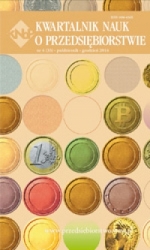Walut światy równoległe
Main Article Content
Abstract
W społeczeństwie wciąż istnieją niezaspokojone potrzeby związane z systemem pieniężnym, których nie rozwiązuje system oficjalny: potrzeby rozwoju lokalnych społeczności i sąsiedzkiej wymiany, anonimowości, niezależność od państwa, potrzeba namacalności wartości, potrzeba stabilności. Próby wyjścia im naprzeciw materializują się w postaci alternatywnych względem oficjalnego pieniądza walut: począwszy od walut społecznych opartych na wzajemnym kredycie, wirtualnych walut gier komputerowych, walut komercyjnych, aż do jednego z najważniejszych wynalazków XXI wieku: kryptowalut, w tym najsłynniejszą z nich bitcoinem. W oparciu o zebrane dane i informacje na temat ok. 6000 walut, autor dokonuje ich analizy pod kątem motywów ich inicjowania, potrzeb jakie zaspokajają oraz mechanizmów ich działania.
Downloads
Article Details
The author of the article declares that the submitted article does not infringe the copyrights of third parties. The author agrees to subject the article to the review procedure and to make editorial changes. The author transfers, free of charge, to SGH Publishing House the author's economic rights to the work in the fields of exploitation listed in the Article 50 of the Act of 4 February 1994 on Copyright and Related Rights – provided that the work has been accepted for publication and published.
SGH Publishing House holds economic copyrights to all content of the journal. Placing the text of the article in a repository, on the author's home page or on any other page is allowed as long as it does not involve obtaining economic benefits, and the text will be provided with source information (including the title, year, number and internet address of the journal).
References
2. AOCS, http://opencurrency.com/the-standard.
3. Bitcoin wiki, https://en.Bitcoin.it/wiki/List_of_alternative_cryptocurrencies, dostęp 11/07/2014.
4. bitpay, https://bitpay.com.
5. Bliive, http://bliive.com.6. Cahn E.S. [2004], No More Throw Away People, Washington, DC, Essential Books.
7. Cahn E.S. [2013], Time Banking: An Idea Whose Time Has Come?, Yes Magazine, Retrieved 7 April.
8. Cahn E.S. [1999], Time dollars, work and community: from ‘why?’ to ‘why not’?, Futures, No. 31.
9. CES, Community Exchange System, http://www.community-exchange.org.
10. CC, Complementary Currency.org, http://www.complementarycurrency.org/ccDatabase/les_public.html.
11. CCT, Crypto-Coins-Table, http://crypto-coins-table.com.
12. CCMC, Crypto-Currency Market Capitalization, https://coinmarketcap.com.
13. ECB [2012], Virtual currency schemes, European Central Bank, October, p. 13.
15. FCM, Future City Money, www.hourworld.org/_FAQ.htm, dostęp 2/10/2014.
16. Gadomski W. [2010], Islamska odpowiedź na problemy finansowe świata, www.obserwatorfinansowy.pl, dostęp 15/09.
17. Galbraith J. K., [2011], Pieniądz. Pochodzenie i losy, Warszawa, PTE, [pierwsze wydanie 1975], s. 98, 112.
18. Gelleri C. [2009], Chiemgauer Regiomoney, International Journal of Community Currencies, https://ijccr.files.wordpress.com/2012/05/ijccrvol132009pp61-75gelleri.pdf.
19. Hayek F.A. [1976], Denationalisation of Money, London, The Institute of Economic Affairs.
20. Lets-linkup, http://www.lets-linkup.com.
21. LETSystem – new money, http://www.gmlets.u-net.com/explore/home.html.
22. Lietaer B., Hallsmith G. [2006], Community Currency Guide, https://www.community-exchange.org, dostęp 10/09/2014.
23. Lietaer B. [2002], The Future of Money, Century, The Random House Group.
24. Mishkin F.S. [2012], Economics of Money, Banking and Financial Markets, 10th Edition, Prentice Hall.
25. Modrzejewski D. [2011], Teoria denacjonalizacji pieniądza Friedricha von Hayeka, praca magisterska napisana pod kier. nauk. dr. hab. R. Bartkowiaka, SGH, Katedra Historii Myśli Ekonomicznej.
26. Nakamoto S., Bitcoin. A Peer-to-Peer Electronic Cash System, http://bitcoin.org/bitcoin.pdf, dostęp 9/09/2014.
27. PCRdC, Para compartir recetas de cocina, https://ar.groups.yahoo.com/neo/groups/recetastrueque/conversations/messages.
28. PWN, http://encyklopedia.pwn.pl/haslo.php?id=3874125, dostęp 6/10/2014.
29. RdT, Red de Trueque, https://twitter.com/Reddetrueque.
30. TDB [2012],, Why Is the UN Installing Mutual Credit/Pure Fiat Systems Around the World?, TheDaily Bell, 5/12/2013, www.thedailybell.com, dostęp 2/10/2014.
31. Timebanks, http://community.timebanks.org.
32. Timerepublik, https://timerepublik.com.33.
33. TyA, Trueque y Autosuficiencia, Programa de Radio Semanal, www.facebook.com/truequeyautosufic.
34. Unilets, http://www.unilets.org/urlsnat.htm.
35. UPUE, Urząd Publikacji UE, http://publications.europa.eu/code/pl/pl-5000500.htm.
36. Wikipedia/a, http://en.wikipedia.org/wiki/Chiemgauer.
37. Wikipedia/b, http://en.wikipedia.org/wiki/List_of_Canadian_community_currencies.
38. Wikipedia/c, http://en.wikipedia.org/wiki/List_of_community_currencies_in_the_United_States.
39. Wile R. [2013], The Daily Value Of Bitcoin Transactions Has Passed Western Union’s And It’s Catching Up To Paypal’s, Biznes Insider, 5/12/2013, www.businessinsider.com, dostęp 14/08/2014.

